

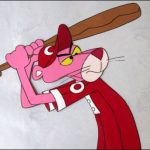
The Pink Panther never appeared on a baseball field in his theatrical career. However, his move to television found him in the stadium on at least four occasions, which will be elaborated-upon below. The remainder of today’s coverage will recount various offerings from the pens of DIC, along with a bonus extra from Filmation overlooked last week, featuring a character who crossed the base-lines to appear in both Filmation and DIC product.

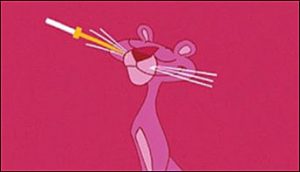 The Panther’s first appearance at the plate was in a short interstitial prepared for the NBC run of the original Pink Panther cartoons, featuring Pink batting against the Ant as pitcher, with Aardvark awaiting the ball in the field. Ant’s wind-up produces a low fast ball. While it would certainly be out of the strike zone, Pink decides to take advantage of the pitch, disappearing from the plate briefly to discard his bat, and replace it with a golf driver. A regulation golf swing, and Pink sends the ball soaring toward the outfield. Aardvark backs up, and up, until the ball lands on top of him, but not in either hand. Aardvark lies prone on his back, with the ball stuck upon the tip of his compressed long nose. A narrator states that he blew it – literally – as Aardvark snorts the ball off his nose skyward instead of hanging onto it (though I still don’t know why using his manipulative nose would not have been scored as a fair catch). Pink is rounding the bases, and the ball seems to be coming down on a trajectory to land between third base and home. Ant races toward the descending ball, while Pink races for the plate. The ball comes dwn squarely upon Pink’s head, causing him to keel over forward into unconsciousness, landing with his chin on top of Ant, who is also knocked cold.. The narrator sums up the play: “Three men out on one pitch – and one big error.” Said interstitial is second to last in a collection of such bumpers embedded below.
The Panther’s first appearance at the plate was in a short interstitial prepared for the NBC run of the original Pink Panther cartoons, featuring Pink batting against the Ant as pitcher, with Aardvark awaiting the ball in the field. Ant’s wind-up produces a low fast ball. While it would certainly be out of the strike zone, Pink decides to take advantage of the pitch, disappearing from the plate briefly to discard his bat, and replace it with a golf driver. A regulation golf swing, and Pink sends the ball soaring toward the outfield. Aardvark backs up, and up, until the ball lands on top of him, but not in either hand. Aardvark lies prone on his back, with the ball stuck upon the tip of his compressed long nose. A narrator states that he blew it – literally – as Aardvark snorts the ball off his nose skyward instead of hanging onto it (though I still don’t know why using his manipulative nose would not have been scored as a fair catch). Pink is rounding the bases, and the ball seems to be coming down on a trajectory to land between third base and home. Ant races toward the descending ball, while Pink races for the plate. The ball comes dwn squarely upon Pink’s head, causing him to keel over forward into unconsciousness, landing with his chin on top of Ant, who is also knocked cold.. The narrator sums up the play: “Three men out on one pitch – and one big error.” Said interstitial is second to last in a collection of such bumpers embedded below.
Pinky At the Bat (Pink Panther and Sons, 9/8/84) – Pink Panther and Sons was a series concept that dropped completely out of the mold of its predecessor theatrical series, practically forgetting the feline who had started it all, and turning over nearly all screen time to his sons from nowhere (Did he marry the girl panther seen in “Pink at First Sight”?), pre-adolescent Pinky and toddler Panky. The entire mood of the show seems shifted to talking-down to the tiny tots, forgetting the basics of pratfall comedy, and closer-resembling watching an episode of the Get-Along Gang than anything from DePatie-Freleng.
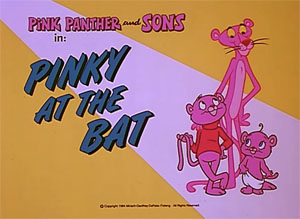 First, it should be noted that this show breaks the color barrier – literally – in establishing that panthers now come not only in pink, but in all the colors of the rainbow – such that Pinky’s and Panky’s group of friends are actually known as the Rainbow Panthers! (I never knew that a single type of animal could become so spectrum-versatile – short of parrots.) And, while it appears Dad still continues to be the strong, silent type, all these junior panthers can talk without a hitch – except for one who only communicates in mumbles. Despite enough voices to present a decent number of players on the field, the show fails to establish any breakout personalities, and plays like any standard bland pre-schooler cartoon you’d aim at the 7:00 to 8:00 time slot of a broadcast day (though I believe NBC programmed it for a considerably later time-berth).
First, it should be noted that this show breaks the color barrier – literally – in establishing that panthers now come not only in pink, but in all the colors of the rainbow – such that Pinky’s and Panky’s group of friends are actually known as the Rainbow Panthers! (I never knew that a single type of animal could become so spectrum-versatile – short of parrots.) And, while it appears Dad still continues to be the strong, silent type, all these junior panthers can talk without a hitch – except for one who only communicates in mumbles. Despite enough voices to present a decent number of players on the field, the show fails to establish any breakout personalities, and plays like any standard bland pre-schooler cartoon you’d aim at the 7:00 to 8:00 time slot of a broadcast day (though I believe NBC programmed it for a considerably later time-berth).
The Rainbow Panthers are playing ball in a sandlot field, when the local bullies, a squad of lion cubs known as the Howl’s Angels (all riding bikes instead of motorcycles), muscle in on their field, announcing their intention to take it over as their turf. The panthers hold their ground, insisting that they were there first, and intending to finish their practice game. Standards and practices being what they were, no one comes to blows, and the lions hang around to jeer the panthers’ sloppy playing. The inevitable grudge bet is made between the Panthers and Angels for a match-up tomorrow, winner obtaining rights to the field (at least for a month).
Though Pinky, who was responsible for taking the bet in the first place, is confident the Panthers can show up the Angels tomorrow, the team members are not so sure, and many attempt to feign excuses not to show up. However, Pinky thinks they just need some inspiration and a chance to brush up on their basics. This Pinky finds by talking to Dad (who of course doesn’t talk back), as Papa Pink gets the team tickets to a professional ball game to watch how the big-leaguers do it. The home team playing at the local stadium is referred to as the Ducksters – however, it becomes quite obvious who they are really supposed to be, when little Panky wanders into the dugout to attempt to get an autograph from the team manager – the real-life Tommy Lasorda! Providing his own voice-over for his animated form, Lasorda hears the pleas of Pinky and the team for some pointers, and spends most of the evening after the game giving them basic training – which seems considerably above basics, including references to the squeeze at home and double-steal.
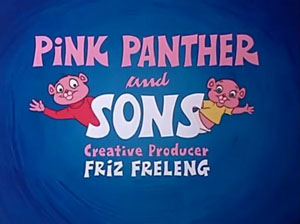 Game day finds the Angels’ leader insisting on acting as umpire, just to make sure the scales of victory are tipped the Angels’ way. A perfect strike tossed by Pinky is called “Ball One”, and further bad calls continue in the Angels’ favor throughout the game. But it’s hard to call a runner out if he hits one over the fence. The Angels try, stealing away one home run by deliberately positioning one of their fielders on the opposite side of the fence, standing on a stepladder. But the next batter hits one out of the fielder’s reach, causing the stepladder to topple, and the Panthers are on the board. Little Panky, used to clinging to his big brother’s tail wherever he goes, is left on the bench while Pinky plays, but thinks he doesn’t have a good enough view of the game. So, he enters an apartment complex several stories high, and emerges on a clothesline between buildings, suspended from the rope by a clothespin clipped to his diaper. The mumbling panther spots Panky and signals Pinky of the danger while still at bat, costing the mumbler a strikeout. Pinky races to the rescue, just as the diaper of Panky rips. and follows Panky in downward flight, Pinky racing down multiple flights of stairs while Panky intercepts several more clotheslines which only slow his progress as he slips through various garments hung on each line. Pinky arrives at street level in the nick of time, and instructs Panky to assume his usual grasp on Pinky’s tail to keep out of danger. But before Panky can latch on, the Angels’ leader, hiding in a nearby bush, smears a paintbrush full of glue upon the tip of Pinky’s tail, causing Panky’s hands to get firmly stuck to his brother’s appendage.
Game day finds the Angels’ leader insisting on acting as umpire, just to make sure the scales of victory are tipped the Angels’ way. A perfect strike tossed by Pinky is called “Ball One”, and further bad calls continue in the Angels’ favor throughout the game. But it’s hard to call a runner out if he hits one over the fence. The Angels try, stealing away one home run by deliberately positioning one of their fielders on the opposite side of the fence, standing on a stepladder. But the next batter hits one out of the fielder’s reach, causing the stepladder to topple, and the Panthers are on the board. Little Panky, used to clinging to his big brother’s tail wherever he goes, is left on the bench while Pinky plays, but thinks he doesn’t have a good enough view of the game. So, he enters an apartment complex several stories high, and emerges on a clothesline between buildings, suspended from the rope by a clothespin clipped to his diaper. The mumbling panther spots Panky and signals Pinky of the danger while still at bat, costing the mumbler a strikeout. Pinky races to the rescue, just as the diaper of Panky rips. and follows Panky in downward flight, Pinky racing down multiple flights of stairs while Panky intercepts several more clotheslines which only slow his progress as he slips through various garments hung on each line. Pinky arrives at street level in the nick of time, and instructs Panky to assume his usual grasp on Pinky’s tail to keep out of danger. But before Panky can latch on, the Angels’ leader, hiding in a nearby bush, smears a paintbrush full of glue upon the tip of Pinky’s tail, causing Panky’s hands to get firmly stuck to his brother’s appendage.
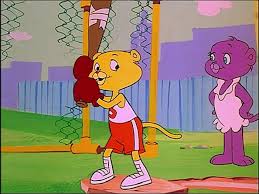 The panthers are down by a run in the last inning with two out and no one on base, as Pinky’s turn at bat is called for. Pinky attempts to approach the plate, but finds his brother stuck fast to him. He attempts to call for time, but the Angel umpire tells him to either bat, or forfeit the game. Two strikes quickly pass unanswered during the verbal confrontation, and Pinky is left with only the payoff pitch as his last chance. But of course, Pinky gets a hit, and runs the bases, dragging Panky behind. The ball bounces off the heads of three fielders, ricochets off the wall, and rolls between the legs of two more fielders. The Angels’ pitcher finally retrieves it, and races on his bicycle toward the plate. But Pinky and Panky reach home before him. The desperate Angels’ umpire seems about to make the deliberate wrong call of “Yer Out”, when another voice makes the call of “Safe”. Tommy Lasorda has shown up to catch the end of the game. Lasorda also declares that the Panthers win. “What are you tryin’ to pull?”, shouts the Angels’ pitcher, reminding Lasorda that Pinky’s run merely ties the game rather than wins it. But Lasorda reminds the pitcher that Pinky had to run with Panky attached, who also crossed the plate – this should score for at least half a run, making the final score 2 1/2 to 2. “Hey, that’s no fair”, continues the pitcher, “You’re trying to stick us.” “Why not?”, replies Pinky, finally prying off Panky with the loss of several inches of his own tail fur. “…You stuck us!”
The panthers are down by a run in the last inning with two out and no one on base, as Pinky’s turn at bat is called for. Pinky attempts to approach the plate, but finds his brother stuck fast to him. He attempts to call for time, but the Angel umpire tells him to either bat, or forfeit the game. Two strikes quickly pass unanswered during the verbal confrontation, and Pinky is left with only the payoff pitch as his last chance. But of course, Pinky gets a hit, and runs the bases, dragging Panky behind. The ball bounces off the heads of three fielders, ricochets off the wall, and rolls between the legs of two more fielders. The Angels’ pitcher finally retrieves it, and races on his bicycle toward the plate. But Pinky and Panky reach home before him. The desperate Angels’ umpire seems about to make the deliberate wrong call of “Yer Out”, when another voice makes the call of “Safe”. Tommy Lasorda has shown up to catch the end of the game. Lasorda also declares that the Panthers win. “What are you tryin’ to pull?”, shouts the Angels’ pitcher, reminding Lasorda that Pinky’s run merely ties the game rather than wins it. But Lasorda reminds the pitcher that Pinky had to run with Panky attached, who also crossed the plate – this should score for at least half a run, making the final score 2 1/2 to 2. “Hey, that’s no fair”, continues the pitcher, “You’re trying to stick us.” “Why not?”, replies Pinky, finally prying off Panky with the loss of several inches of his own tail fur. “…You stuck us!”
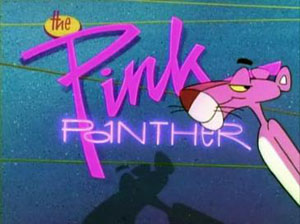 Strike Flea! You’re Out! (The New Pink Panther Show, 10/20/93) is one of those overly long, talking Pink Panther television episodes voiced by Matt Frewer (Max Headroom), which proves to be a bit better than usual, but falters as usual in the ending. Pink is a wanna-be rookie trying out for a team known as the Mutts. The Mutts’ regular pitcher (Rex D. Ball) is busy beaning batters, so Pink is given a chance to show his stuff to manager La Bamba (any similarity to Lasorda is purely intentional – even the team announcer sounds like Vin Scully). Pink winds up – and the ball dies halfway to the plate. La Bamba tells him to face it, “When you stink, you stink!” But Pink is so anxious to make the team that La Bamba finds one remaining opening for him – as dog washer for the team mascot. Rex (who has an odd split personality fixation of talking to his baseball, on which he has drawn a face and who he refers to as “Spalding”) razzes Pink on his new position, calling him a “flea agent”. Pink shrugs off the comment from the kook, just as a flea escapes from the bath water and jumps onto the panther. Pink goes into a fitful series of twitches amounting to a “wind-up”, and hurls a bar of soap out onto the field and through the manager’s hat. La Bamba begs, “Can you do that again – on the field, with a baseball, and not through my hat?”
Strike Flea! You’re Out! (The New Pink Panther Show, 10/20/93) is one of those overly long, talking Pink Panther television episodes voiced by Matt Frewer (Max Headroom), which proves to be a bit better than usual, but falters as usual in the ending. Pink is a wanna-be rookie trying out for a team known as the Mutts. The Mutts’ regular pitcher (Rex D. Ball) is busy beaning batters, so Pink is given a chance to show his stuff to manager La Bamba (any similarity to Lasorda is purely intentional – even the team announcer sounds like Vin Scully). Pink winds up – and the ball dies halfway to the plate. La Bamba tells him to face it, “When you stink, you stink!” But Pink is so anxious to make the team that La Bamba finds one remaining opening for him – as dog washer for the team mascot. Rex (who has an odd split personality fixation of talking to his baseball, on which he has drawn a face and who he refers to as “Spalding”) razzes Pink on his new position, calling him a “flea agent”. Pink shrugs off the comment from the kook, just as a flea escapes from the bath water and jumps onto the panther. Pink goes into a fitful series of twitches amounting to a “wind-up”, and hurls a bar of soap out onto the field and through the manager’s hat. La Bamba begs, “Can you do that again – on the field, with a baseball, and not through my hat?”
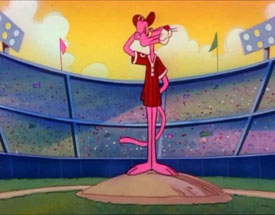 Pink becomes the overnight fast-ball sensation, rocketing the Mutts into the World Series – and leaving Rex sitting out the season on the bench. The flea bites prove equally capable of making a power-hitter out of Pink, too, making him a double threat. Rex vows revenge to Spalding. Rex tries various direct methods, including a baseball full of TNT. Unfortunately, Pink pitches it to a batter who hits it foul, directly into the upper deck bleachers where Rex waits for the explosion. He kicks the ball off the deck, but the team mascot retrieves it for him just in time for the blast. Finally, Rex spots Pink applying the flea to himself, and discovers his secret. Here, the writers fall apart, as Rex obtains the flea in the middle of the World Series with a “flea magnet” (since when are fleas made of metal?), and tosses the flea into the stands, where it gets caught in the fake wig of an angry patron, preventing Pink from getting it back. Pink’s fast ball flops, and La Bamba pulls him from the mound. Let’s break all the rules of major league baseball, shall we – as Pink, despite being pulled in the top of the inning, is allowed to bat in the bottom of the 9th. (????????) And with no flea, and no other secret weapon of explanation, Pink finally hits a homer of his own power to win the game – and no punchline. Script quality just dropped off the scorecard.
Pink becomes the overnight fast-ball sensation, rocketing the Mutts into the World Series – and leaving Rex sitting out the season on the bench. The flea bites prove equally capable of making a power-hitter out of Pink, too, making him a double threat. Rex vows revenge to Spalding. Rex tries various direct methods, including a baseball full of TNT. Unfortunately, Pink pitches it to a batter who hits it foul, directly into the upper deck bleachers where Rex waits for the explosion. He kicks the ball off the deck, but the team mascot retrieves it for him just in time for the blast. Finally, Rex spots Pink applying the flea to himself, and discovers his secret. Here, the writers fall apart, as Rex obtains the flea in the middle of the World Series with a “flea magnet” (since when are fleas made of metal?), and tosses the flea into the stands, where it gets caught in the fake wig of an angry patron, preventing Pink from getting it back. Pink’s fast ball flops, and La Bamba pulls him from the mound. Let’s break all the rules of major league baseball, shall we – as Pink, despite being pulled in the top of the inning, is allowed to bat in the bottom of the 9th. (????????) And with no flea, and no other secret weapon of explanation, Pink finally hits a homer of his own power to win the game – and no punchline. Script quality just dropped off the scorecard.
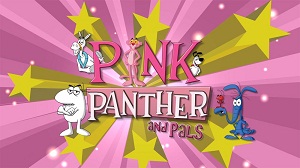 Pink finally scores a bona fide hit with Pink Me Out To the Ball Game (Pink Panther and Pals, 7/20/10). For this incarnation, Pink himself was recast back to his adolescent days, but accurately retains his original pantomime personality, and engages in dialogue-free competitions with his old nemesis, the opaque little man sometimes referred to as Bignose. Bignose and Pink both show up at the same game, in the same bleacher section, armed with catcher’s mitts, looking for a fly ball to catch. Bignose carries a display case full of previously-caught balls, needing the ball of only one more numbered player to complete his collection. He takes an instant dislike to newbie Pink, whom he views as an unwanted competitor for the needed prize for his collection. Sure enough, the desired player hits one into the stands, and both Pink and Bignose scramble to make the catch. Both come up with the ball clutched by just their respective fingertips, and engage in a tug of war over it. The ball escapes both of their grasps, and begins bouncing down the steep aisle stairwell toward the section railing. Pink races down to the bottom step, waiting to make a clean catch of the descending sphere. Bignose attempts to follow, but trips up in attempting to climb over a row of seats, himself tumbling down the stairs in a series of painful bounces. Pink makes his catch, but also catches the brunt of Bignose’s crash into him, sending the ball buncing out of Pink’s glove, and over the railing to the next deck below.
Pink finally scores a bona fide hit with Pink Me Out To the Ball Game (Pink Panther and Pals, 7/20/10). For this incarnation, Pink himself was recast back to his adolescent days, but accurately retains his original pantomime personality, and engages in dialogue-free competitions with his old nemesis, the opaque little man sometimes referred to as Bignose. Bignose and Pink both show up at the same game, in the same bleacher section, armed with catcher’s mitts, looking for a fly ball to catch. Bignose carries a display case full of previously-caught balls, needing the ball of only one more numbered player to complete his collection. He takes an instant dislike to newbie Pink, whom he views as an unwanted competitor for the needed prize for his collection. Sure enough, the desired player hits one into the stands, and both Pink and Bignose scramble to make the catch. Both come up with the ball clutched by just their respective fingertips, and engage in a tug of war over it. The ball escapes both of their grasps, and begins bouncing down the steep aisle stairwell toward the section railing. Pink races down to the bottom step, waiting to make a clean catch of the descending sphere. Bignose attempts to follow, but trips up in attempting to climb over a row of seats, himself tumbling down the stairs in a series of painful bounces. Pink makes his catch, but also catches the brunt of Bignose’s crash into him, sending the ball buncing out of Pink’s glove, and over the railing to the next deck below.
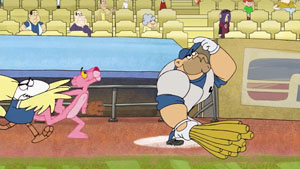 Our two competitors race down to the next level. There, they find the ball caught in the rollers of a motorized hot dog griddle, and engage in some respective log-rolling upon the rollers until the ball is knocked loose. It rolls into the open door of the men’s restroom. Bignose attempts to barge in to retrieve the all, but is seized by a large man waiting his turn to enter the restroom, and is intimidated by the man’s angry gestures to wait his own turn at the end of a long line of humanity behind him, at the end of which Pink has already taken a place which will be ahead of Bignose. Bignose tries to cheat a way of cutting in line. First, he switches places with someone’s little boy, but gets socked by the father back to the line’s end, now several persons longer than it was before. Bignose next gets the idea to adopt celebrity status, somehow finding a costume to dress himself up as a double for the team’s chicken mascot. The fans in line applaud him as he passes, allowing him free rein to approach the open restroom door. But who should come out of the restroom but the real team mascot, who doesn’t take kindly to being impersonated. The real mascot becoes a running gag of the fim, showing up at unexpected moments to resume a fist-fight with Bignose, while Pink finally gets his chance to enter the restroom and retrieve the ball.
Our two competitors race down to the next level. There, they find the ball caught in the rollers of a motorized hot dog griddle, and engage in some respective log-rolling upon the rollers until the ball is knocked loose. It rolls into the open door of the men’s restroom. Bignose attempts to barge in to retrieve the all, but is seized by a large man waiting his turn to enter the restroom, and is intimidated by the man’s angry gestures to wait his own turn at the end of a long line of humanity behind him, at the end of which Pink has already taken a place which will be ahead of Bignose. Bignose tries to cheat a way of cutting in line. First, he switches places with someone’s little boy, but gets socked by the father back to the line’s end, now several persons longer than it was before. Bignose next gets the idea to adopt celebrity status, somehow finding a costume to dress himself up as a double for the team’s chicken mascot. The fans in line applaud him as he passes, allowing him free rein to approach the open restroom door. But who should come out of the restroom but the real team mascot, who doesn’t take kindly to being impersonated. The real mascot becoes a running gag of the fim, showing up at unexpected moments to resume a fist-fight with Bignose, while Pink finally gets his chance to enter the restroom and retrieve the ball.
But Bignose is far from through with the pursuit. More circumstances cause the ball to again bounce over another railing, and down into the good seats and onto the field. A batter is swinging several bats at once to limber up, and upon having the ball drop in front of him, instinctively swings before realizing that was not the ball in play. Somehow, when the ball comes down upon the player’s head, his fall leaves himself, Pink, and Bignose in a heap. A pair of emergency paramedics arrive, but take no one of the three away upon their stretcher. Instead, they carry away the baseball as their patient, transporting it to an upper floor via elevator, and bandaging its wounded horsehide along the way. The panther and Bignose catch up with it, resulting in a wild high-speed chase down a spiraling outer rampway of the stadium, with Bignose riding a Gurney propelled by electric fan and sheet for sail, and Pink close behind on skateboard. Bignose ultimately wins the race for the ball, but meets the waiting fist of the team mascot at the end of the spiraling ramp/ The ball sails loose again, rising into the air as it rolls off the end of Bignose’s overturned Gurney. Pink uses the same Gurney as a skateboard ramp to follow, drops the ball, but makes a miraculous catch of it again in mid-air over center field, when the same batter below again reflexively swats at the ball. The crowd cheers the panther – until he crashes face-first into the side of the scoreboard, and slides off – back into the bleacher section where it all started. He holds up his glove to display the ball – and lets it fall out again, to begin another bounce down the stairs. Well, here we go again.
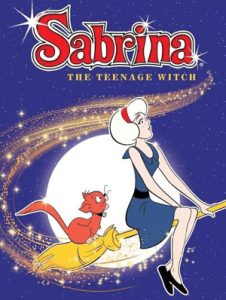 Sabrina, the Teenage Witch, had two entirely-different lives upon the animated screen. She first appeared in an adaptation by Filmation that attempted to closely resemble her comic-book affiliation with the Archie comics line, crossing over into the lives of the students of Riverdale. Much later, the franchise would be revived for a hit live-action television series, which would itself spawn a spin-off, “Sabrina, the Animated Series” from DIC, in which all signs of the Archie gang would be removed, and the community of Riverdale would receive a new but similar name of Greendale.
Sabrina, the Teenage Witch, had two entirely-different lives upon the animated screen. She first appeared in an adaptation by Filmation that attempted to closely resemble her comic-book affiliation with the Archie comics line, crossing over into the lives of the students of Riverdale. Much later, the franchise would be revived for a hit live-action television series, which would itself spawn a spin-off, “Sabrina, the Animated Series” from DIC, in which all signs of the Archie gang would be removed, and the community of Riverdale would receive a new but similar name of Greendale.
Ug at the Bat (Filmation, The Archie Comedy Hour, 1/3/70) focuses on a guest character introduced midway into the series – a caveman named Ug, named for what is practically his only word of primitive language. He was conjured up by a warlock relative from prehistoric times as an attempt to help Sabrina with a history lesson – except that there was some difficulty in working a spell to send him back again to the past. So Ug is temporarily a house guest in the Sabrina household, awaiting a final effort from the warlock to return him to his own era. Though a return spell is promised by evening, Sabrina’s aunt will not be saddled with Ug’s presence for the entire school day, and insists that Sabrina take charge of him until evening. Knowing she has to attend her classes, Sabrina decides to conceal Ug in plain sight, fixing him up with a few magical incantations to resemble a stoop-shouldered high school student, with trimmed hairdo and monogrammed sweater reading “UG”. But one part of Ug’s normal equipment must go – it will never do for Ug to be carrying a club into school. Sabrina thus zaps Ug’s wooden weapon, floating it into a school locker and shutting the locker fast against the protesting fist-pounds of Ug. Ug grunts, in phrases only Sabrina can understand, that he feels insecure without it – presumably much like Linus Van Pelt would feel without his blanket.
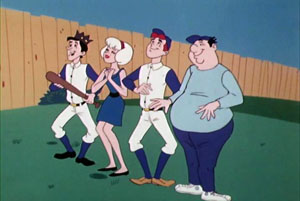 The school day drags on, and Ug remains dejected about the no-club rule – until he
The school day drags on, and Ug remains dejected about the no-club rule – until he
discovers there’s an exception to it, on the baseball field outside the window. Seeing Archie at bat, Ug heads for the classroom door, knocking it down off its hinges in his haste, and racing for the school locker to reclaim his prize possession. Sabrina can see from the look in his eye that there’ll be no stopping him, and decides the best she can do is to cover for him so no one discovers he’s a caveman. Replacing the door in position with a zap. Sabrina next appears inside the locker, stopping Ug’s determined pounding by handing him his club. Ug proceeds to home plate, and bumps out of the way Reggie, depriving him of his turn at bat. If Reggie can’t bat, then he’ll give this little shrimp a taste of his dynamite pitching. But Ug is up to the challenge, belting the first ball out of the park. Reggie tries a machine-gun like series of pitches, with two rows of about a half-dozen baseballs each rolling across his arms and shoulders. But Ug uses the handle of his club like a pool cue, launching each of the balls into the field. Then, for good measure, he runs around the field with a ball bucket, catching each of the flies he previously hit. Reggie is once again humbled at being out-classed, and the Riverdale coach announces they are seeing the team’s new star player.
Sabrina can see a problem. She can’t very well allow Ug to become Riverdale’s new star, since he is supposed to return to prehistoric times that evening. So, perhaps something will need to be done to make sure he doesn’t perform the same way in the afternoon’s game against Crosstown High. The cartoon presents confusing continuity, failing to utilize any form of fade or cross-dissolve to denote the passage of time, and suddenly, we are already transported from the team’s practice game to the real game againt Crosstown in progress. Ug comes to bat, while, from the stands, Sabrina begins putting hexes on the ball, casing it to zig and zag, and to burroe in the ground like a gopher before rising to cross the plate, resulting in a strikeout for Ug. Riverdale’s coach begins to develop fainting spells, much as if someone switched his star player for a no-talent ringer. This goes on throughout the game, Sabrina’s magic leaving Ug hitless. Archie’s bat, however, keeps Riverdale on the boards, and the bottom of the ninth finds Riverdale behind by only a run, with one man on base, two out, and the potential winning run coming to the plate. But whose turn at bat is it? Ug’s. The fans boo loudly as a weary and dejected Ug trudges to the plate. Sabrina realizes her magic has been pretty hard on Ug, and that there must be some other way to get Ug off the team rather than messing with his natural playing abilities. So, she decides to let Ug take this at-bat without interference. But Ug is still too down-in-the dumps about himself, and lets two pitches sail by without even lifting his club. Sabrina sees that Ug has lost his confidence, but knows she can’t just hex him to hit, as that would be cheating in Riverdale’s favor. Thus, she waves a Riverdale pennant, and loudly shouts to Ug from the stands that she believes in him. This is enough incentive for Ug to change his mood, and acquire a grin of determination across his face, as the last ball sails toward him. WHAM!! A shot taken from outer space shows us the baseball, spiraling out of Earth orbit and heading for space, the final frontier.
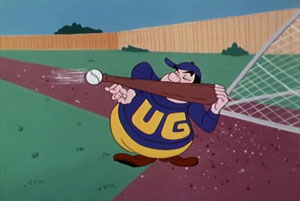 Riverdale wins, and Principal Weatherby steps onto the field to shake the hand of their new star. He first asks Ug what his last name is, and receives a grunt in response. “Ug Ug”, he shrugs, “Why not?” But Sabrina has been hatching up the solution to their problem, and suggests that Mr. Weatherby might like to have Ug autograph a baseball for him. Ug is handed a pen, and makes his mark upon a baseball – the single letter, “X”. Mr, Weatherby is shocked, realizing that their star player can’t even write. With regret, he informs Ug that he must be disqualified from further play for the team until he gets his academic skills up and learns to write. Mr. Weatherby suggests the possibility of private tutoring, and Sabrina claims she knows just the person right for the job. The final scenes find Sabrina’s aunt complaining at the thought of Sabrina hiring a tutor for Ug, and the prospect that Ug might come back upon becoming so schooled. Sabrina calms her, by pointing out that with the tutor she’s chosen, that may be a long time in coming. She and her aunt transport themselves back to the stone age for a look-see, revealing that the tutor is the same warlock who brought Ug to the present by botched magic in the first place. As he attempts to have Ug write the word Cat (which Ug spells “Kat”), the warlock corrects him, demonstrating his own entire lack of smarts, by revising the spelling to “Katt”. “See what I mean?”, says Sabrina to her aunt for the curtain line.
Riverdale wins, and Principal Weatherby steps onto the field to shake the hand of their new star. He first asks Ug what his last name is, and receives a grunt in response. “Ug Ug”, he shrugs, “Why not?” But Sabrina has been hatching up the solution to their problem, and suggests that Mr. Weatherby might like to have Ug autograph a baseball for him. Ug is handed a pen, and makes his mark upon a baseball – the single letter, “X”. Mr, Weatherby is shocked, realizing that their star player can’t even write. With regret, he informs Ug that he must be disqualified from further play for the team until he gets his academic skills up and learns to write. Mr. Weatherby suggests the possibility of private tutoring, and Sabrina claims she knows just the person right for the job. The final scenes find Sabrina’s aunt complaining at the thought of Sabrina hiring a tutor for Ug, and the prospect that Ug might come back upon becoming so schooled. Sabrina calms her, by pointing out that with the tutor she’s chosen, that may be a long time in coming. She and her aunt transport themselves back to the stone age for a look-see, revealing that the tutor is the same warlock who brought Ug to the present by botched magic in the first place. As he attempts to have Ug write the word Cat (which Ug spells “Kat”), the warlock corrects him, demonstrating his own entire lack of smarts, by revising the spelling to “Katt”. “See what I mean?”, says Sabrina to her aunt for the curtain line.
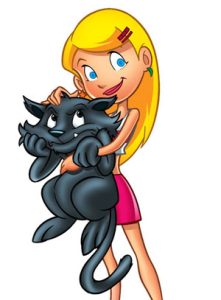 Jumping ahead a bit, we compare a Sabrina episode from the DIC output. DIC’s Sabrina is considerably more youthful, and also strictly at learner’s level when it comes to practicing her magic – a fact she becomes painfully aware of in Field of Screams (10/21/99). Sabrina is the manager of a baseball team, with much the same problems as Charlie Brown – they always lose. Sabrina’s pitcher, her would-be boyfriend Harvey, is resigned to it, even appreciating it, as he spends more time on the mound and gets more experience than any other pitcher in the league, waiting long for each inning to end and the sides to change. But Sabrina has had it – especially with having to endure the sneers and jeers of her arch-rival, rich kid Gem and her team, who always walk away with a victory. (Gem makes a habit of closing each game with an insulting wise crack shouted out of her limousine window, but chastises her driver for habitually failing to pull away precisely on cue just after she has uttered her insult.) Sabrina’s mortal Uncle Quigley suggests that she, as a manager, needs to look deep into her team to find the hidden strengths of her players, but ths advice does little to console Sabrina. Her best friend Chloe (the only one outside the family who knows she is a witch) suggests that maybe it’s time for her to dip into the family magic bag of tricks in attempt to solve this problem. Despite the ethical dilemma this presents, the urge is too tempting to find out what victory feels like, and Sabrina’s cat-medium Salem seconds the motion. Sabrina digs into the family “Spookie Jar” for an appropriate magic spell, and utters an incantation to populate her team with winners. At first, nothing seems to have occurred. But the next day, an odd squad of new players appear at their field, volunteering as the “winners” she conjured up. To Sabrina’s and Chloe’s eyes, they are somewhat horrifying, consisting of such players as a junior vampire, cyclops, mummy, Frankenstein, werewolf, and various other inhabitants of the Netherworld. But oddly, to the rest of the team, they look like just a bunch of normal kids, Sabina surmising that only those present when the spell was cast must be able to see their true identities. These new kids on the block prove to be dynamic baseball players, with special playing abilities not visible to the human eye (such as Mummy, who can snag high fly balls by merely unwinding and tossing upwards his mummy wrappings, while to the spectators, it looks like he simply stretched his arm into the air. The vampire, self-proclaimed leader of the monster pack, takes offense when some of his squad are left out of the starting lineup by Sabrina, who wants Harvey, Chloe, and others to get a chance to play. Sabrina’s team finally wins a game from Gem’s bunch – but not by enough, in the opinion of the vampire.
Jumping ahead a bit, we compare a Sabrina episode from the DIC output. DIC’s Sabrina is considerably more youthful, and also strictly at learner’s level when it comes to practicing her magic – a fact she becomes painfully aware of in Field of Screams (10/21/99). Sabrina is the manager of a baseball team, with much the same problems as Charlie Brown – they always lose. Sabrina’s pitcher, her would-be boyfriend Harvey, is resigned to it, even appreciating it, as he spends more time on the mound and gets more experience than any other pitcher in the league, waiting long for each inning to end and the sides to change. But Sabrina has had it – especially with having to endure the sneers and jeers of her arch-rival, rich kid Gem and her team, who always walk away with a victory. (Gem makes a habit of closing each game with an insulting wise crack shouted out of her limousine window, but chastises her driver for habitually failing to pull away precisely on cue just after she has uttered her insult.) Sabrina’s mortal Uncle Quigley suggests that she, as a manager, needs to look deep into her team to find the hidden strengths of her players, but ths advice does little to console Sabrina. Her best friend Chloe (the only one outside the family who knows she is a witch) suggests that maybe it’s time for her to dip into the family magic bag of tricks in attempt to solve this problem. Despite the ethical dilemma this presents, the urge is too tempting to find out what victory feels like, and Sabrina’s cat-medium Salem seconds the motion. Sabrina digs into the family “Spookie Jar” for an appropriate magic spell, and utters an incantation to populate her team with winners. At first, nothing seems to have occurred. But the next day, an odd squad of new players appear at their field, volunteering as the “winners” she conjured up. To Sabrina’s and Chloe’s eyes, they are somewhat horrifying, consisting of such players as a junior vampire, cyclops, mummy, Frankenstein, werewolf, and various other inhabitants of the Netherworld. But oddly, to the rest of the team, they look like just a bunch of normal kids, Sabina surmising that only those present when the spell was cast must be able to see their true identities. These new kids on the block prove to be dynamic baseball players, with special playing abilities not visible to the human eye (such as Mummy, who can snag high fly balls by merely unwinding and tossing upwards his mummy wrappings, while to the spectators, it looks like he simply stretched his arm into the air. The vampire, self-proclaimed leader of the monster pack, takes offense when some of his squad are left out of the starting lineup by Sabrina, who wants Harvey, Chloe, and others to get a chance to play. Sabrina’s team finally wins a game from Gem’s bunch – but not by enough, in the opinion of the vampire.
The season progresses. The team continues to win, by increasing numbers of runs – but still the vampire isn’t satisfied. To Sabrina’s surprise, the vampire takes it upon himself to give one of her team’s players the signal to leave the field and take the bench, replacing the player with one of his monsters. Sabrina protests that she is the manager. No, retorts the vampire. “I am the manager”. He insists, and tells Sabrina to back down and return to her place in the outfield, or he will have her ejected too. Sabrina doesn’t know how to handle him, and is afraid to do anything for fear of losing him and his fellow winning players. As further games take place, more and more of Sabrina’s old teammates are left to warm the bench, while the monsters play – and finally, Sabrina herself is ejected, leaving the monsters in complete control of the field. This continues game after game, and while Sabrina tries to bring consolation to her old teammates from the fact that at least they’re on a winning team, the others find it hard if not impossible to feel they are on any team when they are entirely deprived of the ability to play.
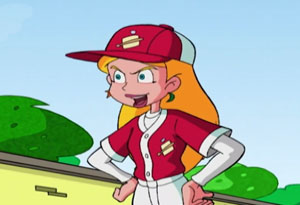 Things get worse after the games. Looking to take their minds off things by spending some R&R time in their favorite restaurants, arcades, etc., Sabrina’s gang find that the monsters have also occupied and completely taken over all of their favorite hangouts, posting signs in the windows reading “Private Party” and “No Greendaleans Allowed.” Time for a sjowdown with these guys. Bit an intrusion upon the monsters’ nightly doings in the graveyard accomplishes little, as Sabrina’s spells can’t cast the monsters back to the Netherworld. Knowing the monsters are always up for a game, Sabrina resorts to a grudge bet – if she can produce a team that will beat the monsters, they will return to the Netherworld. If Sabrina’s team loses, Sabrina herself will be banished to the Netherworld forever.
Things get worse after the games. Looking to take their minds off things by spending some R&R time in their favorite restaurants, arcades, etc., Sabrina’s gang find that the monsters have also occupied and completely taken over all of their favorite hangouts, posting signs in the windows reading “Private Party” and “No Greendaleans Allowed.” Time for a sjowdown with these guys. Bit an intrusion upon the monsters’ nightly doings in the graveyard accomplishes little, as Sabrina’s spells can’t cast the monsters back to the Netherworld. Knowing the monsters are always up for a game, Sabrina resorts to a grudge bet – if she can produce a team that will beat the monsters, they will return to the Netherworld. If Sabrina’s team loses, Sabrina herself will be banished to the Netherworld forever.
To increase her squad, Sabrina, without letting on that her new players were monsters, joins forces and allegiances with Gem’s team, telling Gem that the new kids are taking over all of their lives in Greendale, and will leave only if they are defeated – a fight for life in Greendale as they know it. Gem reluctantly agrees to contribute her best players to Sabrina’s game, but acknowledges that, given the new kids’ consistent winning record against them, this still leaves Sabrina’s augmented squad little chance.
When game time arrives, Sabrina and Gem review their starting lineup. Gem’s best players are there, while several of the lesser players of Sabrina’s team still remain on the bench. Sabrina remembers the words of Uncle Quigley, about a manager’s job being to determine the pkayers’ hidden strengths. Sabrina asks one boy, a math nerd, for an instant calculation of where a ball will land if hit by a player of such and such height and weight when pitched at X miles per hour. Within seconds, he has a precise location. She asks another shorty just how small he can make himself at the plate. “Pretty darn small”, he responds. Sabrina substitutes the two in place of two of Gem’s jocks, though Gen thinks she’s crazy. The two turn out to give the team a surprise edge the monsters have not faced before. The little player pulls the old can’t-find-the-strike-zone trick, compressing himself at the plate to where he seems to fit entirely inside his batting helmet. The nerd pulls out a slide rule, takes eye measurements of the batters, and is always under the high flies to make the outs. Harvey performs up to his best potential, contributing some key hits and decent pitching, and just plain happy at being off the bench. Salem distracts the werewolf outfielder, by tossing a stick, which the wolf runs to retrieve like a dog instead of catching the baseball. It comes down to needing a final out, facing Frankenstein at bat. To the math nerd’s surprise, Frankenstein tosses his regulation bat away, and chooses one twice its size. “This throws off all my calculations”, states the startled nerd, whipping out his pencil and slide rule to jot down a whole column of new figures. The revised totals indicate the ball will be over the fence! As Frankenstein swings, four of Sabrina’s players climb atop each other’s shoulders at the fence, with the nerd kid on top. The human column wobbles, but is in the right place according to the calculations. The ball lands in the nerd’s mitt, but the column topples to the ground. Everyone waits until the dust clears – to find the nerd still holding onto the ball in his glove. Realizing the game is up, the vampire makes a half-hearted attempt to change the wager, remarking, “Best two out of three?”, but is quickly zapped out of existence on this plane, along with his fellow teammates, as he shouts, “Curse you, Sabrina Spellman!” Sabrina and the others realize they finally had fun – something they hadn’t experienced in a long, long time, and Sabrina wishes she had figured out her proper managing role before the Summer ran out. But then, there’s basketball season coming up, and Sabrina also thinks she’s figured out what went wrong with her past spells… Dream on.
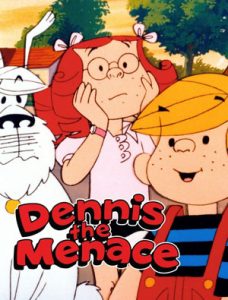 Baseball’s Best Ballplayer (DIC, Dennis the Menace, 11/17/86) – A fairly brief story, as Dennis scores the winning run in a kiddie league game, and imagines what it must be like to hear the resounding cheers of a stadium full of rabid fans, though there seems to be no one in attendance to root for him in this game. The other kids stampede off the field when the Coach suggests they end the day with some lunch. Brushing off the dust tracks made by the kids’ shoes upon his uniform, the Coach asks Dennis, the last on the field, if he has the energy to put the equipment away in a shed. Dennis claims a big leaguer always has plenty of energy. But no sooner has he carried the bat bag into the shed, than a vacant chair inside the shed looks so relaxing. Dennis seats himself, yawns, and stares for a few moments at a wall covered with photos of big league ballplayers. As his eyelids droop, Dennis begins to imagine what it must be like to be a star just like them. We are suddenly transported into Dennis’s dream world, where Dennis plays center field in a game of the World Series, on a team helmed by his father on the pitcher’s mound, with Ruff acting as bat boy, and Joey as a rooting fan in the stands seeking his autograph. On the opposing side, of all people, bats Mr. Wilson, who is robbed of a home run by Dennis’s leaping catch. The sides change, and Dennis is sent to bat, his Dad stating that he’s bet his lunch money upon the team winning this game, and needs a deciding run from Dennis. (Now there’s a bad family influence – his own Dad placing an illegal bet on the game?) Dennis waits for a good pitch, but gets ones obviously too high and too low from Mr. Wilson on the pitcher’s mound. When Dennis challenges the calls, he finds the umpire to also be another Mr. Wilson – and so is the catcher! Dennis wonders if he didn’t notice being beaned – otherwise, why is he seeing triple? But, without further complication, Dennis bears down under the pressure, and hits one out of the park. Dennis is picked up and tossed repeatedly in the air by his teammates, who chant his name repeatedly. The cheers dwindle to one voice – that of Dennis’s coach, who awakens Dennis from his slumber, informing him that he missed lunch. Dennis asks, “Where are all my fans?” “Fans?”, replies the coach. “What do you think, you just won the World Series? Must be nice to dream.” The Coach leaves the shed, and Dennis rises to follow – but not before turning to the pictures on the wall, and doffing his cap to them as if his audience, then leaving the shed for home.
Baseball’s Best Ballplayer (DIC, Dennis the Menace, 11/17/86) – A fairly brief story, as Dennis scores the winning run in a kiddie league game, and imagines what it must be like to hear the resounding cheers of a stadium full of rabid fans, though there seems to be no one in attendance to root for him in this game. The other kids stampede off the field when the Coach suggests they end the day with some lunch. Brushing off the dust tracks made by the kids’ shoes upon his uniform, the Coach asks Dennis, the last on the field, if he has the energy to put the equipment away in a shed. Dennis claims a big leaguer always has plenty of energy. But no sooner has he carried the bat bag into the shed, than a vacant chair inside the shed looks so relaxing. Dennis seats himself, yawns, and stares for a few moments at a wall covered with photos of big league ballplayers. As his eyelids droop, Dennis begins to imagine what it must be like to be a star just like them. We are suddenly transported into Dennis’s dream world, where Dennis plays center field in a game of the World Series, on a team helmed by his father on the pitcher’s mound, with Ruff acting as bat boy, and Joey as a rooting fan in the stands seeking his autograph. On the opposing side, of all people, bats Mr. Wilson, who is robbed of a home run by Dennis’s leaping catch. The sides change, and Dennis is sent to bat, his Dad stating that he’s bet his lunch money upon the team winning this game, and needs a deciding run from Dennis. (Now there’s a bad family influence – his own Dad placing an illegal bet on the game?) Dennis waits for a good pitch, but gets ones obviously too high and too low from Mr. Wilson on the pitcher’s mound. When Dennis challenges the calls, he finds the umpire to also be another Mr. Wilson – and so is the catcher! Dennis wonders if he didn’t notice being beaned – otherwise, why is he seeing triple? But, without further complication, Dennis bears down under the pressure, and hits one out of the park. Dennis is picked up and tossed repeatedly in the air by his teammates, who chant his name repeatedly. The cheers dwindle to one voice – that of Dennis’s coach, who awakens Dennis from his slumber, informing him that he missed lunch. Dennis asks, “Where are all my fans?” “Fans?”, replies the coach. “What do you think, you just won the World Series? Must be nice to dream.” The Coach leaves the shed, and Dennis rises to follow – but not before turning to the pictures on the wall, and doffing his cap to them as if his audience, then leaving the shed for home.
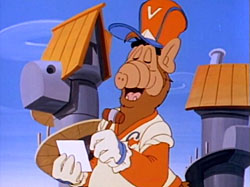 Pride of the Shumways (DIC, Alf, the Animated Series, 11/21/87) – Alf (or, as he was known on the planet Melmac, Gordon Shumway) recounts his brief professional career in the sport of Bouillabaseball – a form of Melmacian baseball, played with dead fish instead of balls. Gordon begins the story as a pitcher in the military league of the Orbit Guard. He is far from the greatest, missing a fish batted (or as they say, splatted) back to him, and claiming foul because the fish still had tartar sauce on it. He also misses further caches because “The suns got in my eyes.” He only succeeds in winning a game by accidentally catching a fish comebacker in his mouth for the final out. His actions are observed by a shady-looking pair of spectators, one of whom claims to be a scout for the pro-league leading Codsters. Gordon is surprisingly offered a contract, which will automatically exempt him from Orbit Guard duty. “Where do I sign?”. responds an eager Gordon.
Pride of the Shumways (DIC, Alf, the Animated Series, 11/21/87) – Alf (or, as he was known on the planet Melmac, Gordon Shumway) recounts his brief professional career in the sport of Bouillabaseball – a form of Melmacian baseball, played with dead fish instead of balls. Gordon begins the story as a pitcher in the military league of the Orbit Guard. He is far from the greatest, missing a fish batted (or as they say, splatted) back to him, and claiming foul because the fish still had tartar sauce on it. He also misses further caches because “The suns got in my eyes.” He only succeeds in winning a game by accidentally catching a fish comebacker in his mouth for the final out. His actions are observed by a shady-looking pair of spectators, one of whom claims to be a scout for the pro-league leading Codsters. Gordon is surprisingly offered a contract, which will automatically exempt him from Orbit Guard duty. “Where do I sign?”. responds an eager Gordon.
Seems that the scout and team manager of the Codsters have been working in cahoots with a big-time gambler, and see an opportunity more lucrative than winning the championship. The gambling odds have stacked so well in favor of the Codsters, that a bet for them to lose would pay off with tremendous odds. So, why not bring in a rank amateur to pitch, sabotaging the team’s chances for victory at the last minute, cash in with a massive bet against them, and split for parts unknown? Gordon is the patsy they have chosen for the instrumental role of ensuring the team’s loss. Things go as expected for the first 26 of 27 innings in a Melmacian game, with the Codsters down 127 to 9, and Gordon having already made 47 errors. A power-hitter (who bends the girders of the batting cage in making his entrance, then rips off one girder to use as a bat) slams a fish into deep space beyond the Melmacian atmosphere, but not out of reach of the planet’s gravitational pull. As Gordon clings to the pantsleg of the behemoth player, trying to slow down his Frankenstein-like advance around the bases, the fish makes a re-entry into the atmosphere, turning into a flaming ball of fire like a mini-comet. Several fielders are calling, “I got it, I got it.” But when they see the fish in flames, they scatter in all directions, calling “You got it! You got it!” The fish smashes into the infield, creating a deep crater in the ground, into which the entire turf of the field and all the Codster players are sucked in (borrowing the closing gag idea from Bob Campett’s “Wagon Heels” for Porky Pig). The grounds crew rolls out a new field like a humongous carpet.
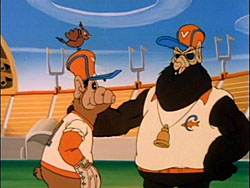 Play is called to a halt due to an invasion of cats into the stadium, seeking to feast upon the fish completely littering the field after 26 innings of play. Just as well, as the fans needed a break from the smell, with gas masks selling well from the vendors in the aisles. Gordon is locked out of the locker room by his fellow players, who know because of whom their championship hopes are about to go down the tubes. Gordon’s little brother Curtis shows up to boost his big brother’s deflated ego, and Gordon spends most of the break giving Curtis a behind the scenes stadium tour, including of the main fish locker where the primary playing equipment is kept. But as Curtis turns to leave after the tour, he passes a door partway ajar, and overhears the manager, scout, and gambler discussing their success and the haul they’ll receive from splitting their shared bet. Curtis reports this shocking news back to Gordon, and the two plot a means to turn the tables on the game.
Play is called to a halt due to an invasion of cats into the stadium, seeking to feast upon the fish completely littering the field after 26 innings of play. Just as well, as the fans needed a break from the smell, with gas masks selling well from the vendors in the aisles. Gordon is locked out of the locker room by his fellow players, who know because of whom their championship hopes are about to go down the tubes. Gordon’s little brother Curtis shows up to boost his big brother’s deflated ego, and Gordon spends most of the break giving Curtis a behind the scenes stadium tour, including of the main fish locker where the primary playing equipment is kept. But as Curtis turns to leave after the tour, he passes a door partway ajar, and overhears the manager, scout, and gambler discussing their success and the haul they’ll receive from splitting their shared bet. Curtis reports this shocking news back to Gordon, and the two plot a means to turn the tables on the game.
Gordon has a live pet fish at home, who can be quite slippery and elusive when brought along by Gordon as a companion at the dinner table despite Ma’s orders against it. Gordon has Curtis retrieve the fish from home, and depends upon the fish’s “strong survival instincts” to make life difficult for the opposing team. Curtis substitutes Gordon’s fish into the opposing pitcher’s fish supply as Gordon comes to bat. The fish is pitched. Gordon swings a regulation mallet at it, feigning a batting swing, but the fish ducks unnoticed under the mallet, then somehow reverses its course in mid-air, acting like it was hit into the infield. The field announcer refers to it as a “grand splat”, and the slippery pet flips and flaps its way around the field, evading the grasp of every fielder who reaches for him. In the Melmacian sport, if the fish is not fielded, the runner gets to continue circling the bases ad infinitum. By the time the fielders get things under control, Gordon has repeatedly crossed the plate, increasing the Codsters’ score to 40 runs. But the fielders have not really caught Gordon’s pet. Instead, the Codsters’ manager has put a stop to the team’s own rally, by hurling at Gordon in the confusion a different fish, its head stuffed with rocks. The booby-trapped fish knocks out Gordon as he runs, leaving a large lump on his head. The gambler in the stands indicates he can always rely on the manager to make good use of a “Rock Cod”.
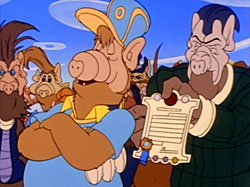 To ensure that nothing else will go wrong, while Gordon is being taken off the field on a stretcher, the manager shifts the batting order – calling for Gordon to immediately bat again. Gordon is barely conscious in the locker room, referring to his old Orbit Guard pals who have come down from the stands to assess his condition by the name of their mutual nursery school teacher from the past. Curtis sees only one way to avoid a game forfeit – take Gordon’s uniform, and impersonate Gordon at the plate. Though it appears that Gordon has lost some height during his brief moments in the locker room, no one notices the switch of players. However, there’s also a switch of ammunition, as the teams call for “fresh fish”, putting Gordon’s pet out of play. Curtis has to do this thing legitimately. To everyone’s surprise, including his own, Curtis hits one into the lower bleachers. Apparently in this sport, the fish remains still in play when hit into the stands, and a fielder scrambles over the outfield fence, but can’t find the fish in play. Curtis circles the bases again and again, and finally wins the game. After the game, Gordon passes his hat to Curtis, announcing his retirement from the sport, and stating that Curtis earned it. The gambling trio, meanwhile, never quite make it out of the stadium, as someone has tipped off the Codster players, who wait outside the manager’s office, armed with their batting mallets. All ends happily, except in Alf’s “Melmacian Memoirs”, where he is forced to finally admit, “I stunk.”
To ensure that nothing else will go wrong, while Gordon is being taken off the field on a stretcher, the manager shifts the batting order – calling for Gordon to immediately bat again. Gordon is barely conscious in the locker room, referring to his old Orbit Guard pals who have come down from the stands to assess his condition by the name of their mutual nursery school teacher from the past. Curtis sees only one way to avoid a game forfeit – take Gordon’s uniform, and impersonate Gordon at the plate. Though it appears that Gordon has lost some height during his brief moments in the locker room, no one notices the switch of players. However, there’s also a switch of ammunition, as the teams call for “fresh fish”, putting Gordon’s pet out of play. Curtis has to do this thing legitimately. To everyone’s surprise, including his own, Curtis hits one into the lower bleachers. Apparently in this sport, the fish remains still in play when hit into the stands, and a fielder scrambles over the outfield fence, but can’t find the fish in play. Curtis circles the bases again and again, and finally wins the game. After the game, Gordon passes his hat to Curtis, announcing his retirement from the sport, and stating that Curtis earned it. The gambling trio, meanwhile, never quite make it out of the stadium, as someone has tipped off the Codster players, who wait outside the manager’s office, armed with their batting mallets. All ends happily, except in Alf’s “Melmacian Memoirs”, where he is forced to finally admit, “I stunk.”
• “Pride of the Shumways” is on Internet Archive
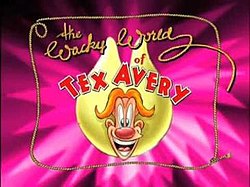 Mine, Mine, Mine (DIC. The Wacky World of Tex Avery, 10/10/97) features a short but memorable baseball gag. Much like Droopy and Butch in MGM’s “Grin and Share It”, Tex and Sid become the 50-50 owners of a gold mine – with one proviso. In the event of one’s death, the survivor gets all the gold. This leads to the expected attempts on Tex’s life, and several homages to classic Avery gags, including running past the film sprockets when rounding a corner in the mine at high speed, and a magnet that attracts larger and larger objects up to an ocean liner. The most memorable original, and somewhat subversive, gag, finds Tex and Sid taking refuge at opposite ends of a mine corridor behind stacks of crates and barrels, and firing away liberally at each other with rifles and pistols. Sid gets an evil idea, and instead of producing a white flag, waves a full-fledged American flag above the top of his stack of crates, and begins singing a full rendition of “The Star-Spangled Banner”. Tex feels it is his patriotic duty to salute the flag, and steps out from behind his stack of barrels, standing in the open at attention, and placing his hat across his heart. When Sid reaches the line “Ans the rockets’ red glare…”. he takes aim, and fires his rifle directly at the unprotected Tex, charring him black. Tex darts back for cover behind the barrels, but Sid continues singing, waving the flag ever more prominently. Still moved by his patrioyic impulses, Tex again comes out of hiding and stands in the open, his face denoting somewhat more unsurety about the whole situation. Another shotgun blast, and another blackening and duck for cover. Still Sid keeps singing, reminding Tex in song that “Our flag was still there”. Once again, Tex steps out, with a look to the audience registering the thought, “What can ya do?” As Sid reaches the final words of the song, he cocks his gun again, ready for another shot. But before he can fire, the voice of Tex is heard, shouting, “Play ball!” A baseball enters the scene, conking Sid squarely between the eyes as a perfect bean ball. As Sid collapses, Tex zips into the frame, wearing an umpire’s mask and chest protector, and declares over the prone Sid, “Yer out!” This series wasn’t always on the mark, but this gag certainly hit home.
Mine, Mine, Mine (DIC. The Wacky World of Tex Avery, 10/10/97) features a short but memorable baseball gag. Much like Droopy and Butch in MGM’s “Grin and Share It”, Tex and Sid become the 50-50 owners of a gold mine – with one proviso. In the event of one’s death, the survivor gets all the gold. This leads to the expected attempts on Tex’s life, and several homages to classic Avery gags, including running past the film sprockets when rounding a corner in the mine at high speed, and a magnet that attracts larger and larger objects up to an ocean liner. The most memorable original, and somewhat subversive, gag, finds Tex and Sid taking refuge at opposite ends of a mine corridor behind stacks of crates and barrels, and firing away liberally at each other with rifles and pistols. Sid gets an evil idea, and instead of producing a white flag, waves a full-fledged American flag above the top of his stack of crates, and begins singing a full rendition of “The Star-Spangled Banner”. Tex feels it is his patriotic duty to salute the flag, and steps out from behind his stack of barrels, standing in the open at attention, and placing his hat across his heart. When Sid reaches the line “Ans the rockets’ red glare…”. he takes aim, and fires his rifle directly at the unprotected Tex, charring him black. Tex darts back for cover behind the barrels, but Sid continues singing, waving the flag ever more prominently. Still moved by his patrioyic impulses, Tex again comes out of hiding and stands in the open, his face denoting somewhat more unsurety about the whole situation. Another shotgun blast, and another blackening and duck for cover. Still Sid keeps singing, reminding Tex in song that “Our flag was still there”. Once again, Tex steps out, with a look to the audience registering the thought, “What can ya do?” As Sid reaches the final words of the song, he cocks his gun again, ready for another shot. But before he can fire, the voice of Tex is heard, shouting, “Play ball!” A baseball enters the scene, conking Sid squarely between the eyes as a perfect bean ball. As Sid collapses, Tex zips into the frame, wearing an umpire’s mask and chest protector, and declares over the prone Sid, “Yer out!” This series wasn’t always on the mark, but this gag certainly hit home.
NEXT WEEK: More action mostly from the 80’s and on, including a forgotten one-shot television special with celebrity appeal.